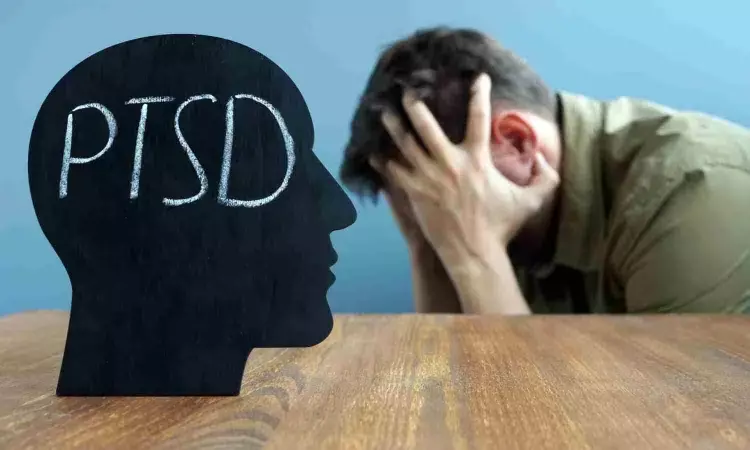- Home
- Medical news & Guidelines
- Anesthesiology
- Cardiology and CTVS
- Critical Care
- Dentistry
- Dermatology
- Diabetes and Endocrinology
- ENT
- Gastroenterology
- Medicine
- Nephrology
- Neurology
- Obstretics-Gynaecology
- Oncology
- Ophthalmology
- Orthopaedics
- Pediatrics-Neonatology
- Psychiatry
- Pulmonology
- Radiology
- Surgery
- Urology
- Laboratory Medicine
- Diet
- Nursing
- Paramedical
- Physiotherapy
- Health news
- Fact Check
- Bone Health Fact Check
- Brain Health Fact Check
- Cancer Related Fact Check
- Child Care Fact Check
- Dental and oral health fact check
- Diabetes and metabolic health fact check
- Diet and Nutrition Fact Check
- Eye and ENT Care Fact Check
- Fitness fact check
- Gut health fact check
- Heart health fact check
- Kidney health fact check
- Medical education fact check
- Men's health fact check
- Respiratory fact check
- Skin and hair care fact check
- Vaccine and Immunization fact check
- Women's health fact check
- AYUSH
- State News
- Andaman and Nicobar Islands
- Andhra Pradesh
- Arunachal Pradesh
- Assam
- Bihar
- Chandigarh
- Chattisgarh
- Dadra and Nagar Haveli
- Daman and Diu
- Delhi
- Goa
- Gujarat
- Haryana
- Himachal Pradesh
- Jammu & Kashmir
- Jharkhand
- Karnataka
- Kerala
- Ladakh
- Lakshadweep
- Madhya Pradesh
- Maharashtra
- Manipur
- Meghalaya
- Mizoram
- Nagaland
- Odisha
- Puducherry
- Punjab
- Rajasthan
- Sikkim
- Tamil Nadu
- Telangana
- Tripura
- Uttar Pradesh
- Uttrakhand
- West Bengal
- Medical Education
- Industry
Psychotherapy reveals encouraging results in PTSD patients with multiple traumatic experiences

Germany: A meta-analysis carried out based on data from around 10,600 patients, found strong evidence that psychological interventions are highly effective treatments for post-traumatic stress disorder (PTSD) in patients with a history of multiple traumatic events.
The findings, published in Lancet Psychiatry, are encouraging for clinical practice and could counteract common misconceptions regarding treatment and treatment barriers.
Psychotherapy is an effective treatment for adults with post-traumatic stress disorder (PTSD) following exposure to multiple traumatic events. This is the conclusion arrived at by an international team of researchers led by psychologists Dr Thole Hoppen and Prof Nexhmedin Morina from the Department for Clinical Psychology and Psychotherapy at the University of Münster (Germany).
The efficacy of psychotherapeutic interventions for treating PTSD in adults has been well-documented in various studies. However, until now, it has not been established whether the efficacy of psychotherapeutic interventions varies depending on whether the disorder is caused by one single event – for example, a traffic accident or by multiple traumatic events such as during warfare or repeated incidents of sexual or physical violence.
In this study, the team of researchers also included Prof Richard Meiser-Stedman from the University of East Anglia (UK), Dr Ahlke Kip from the University of Münster, and Prof Marianne Skogbrott Birkeland from the Research Centre for Violence and Traumatic Stress Studies in Norway – evaluated 137 empirical articles published over the past four decades on the treatment of PTSD in adults. Nexhmedin Morina concludes: “The data show that several psychological interventions are highly effective in treating PTSD following multiple traumatic events – in fact, they are about as effective as when the PTSD follows a single trauma.” These results had, to date, only been reported for the treatment of children and adolescents with PTSD. Now, this study confirms that it also applies in the treatment of PTSD in adults. This is “very encouraging news” for both patients and therapists.
Around four per cent of the global population suffers from PTSD as a result of traumatic events. The characteristic symptoms of PTSD include distressing intrusive traumatic memories, avoidance behaviour and difficulty with emotional regulation. The new findings have implications for the clinical practice and training of psychotherapists and mental health professionals more generally. “Our data helps remove treatment barriers for patients with a history of multiple traumatic events,” says Thole Hoppen. “In addition to patients’ fear of talking about their traumatic experiences, some psychotherapists hesitate to directly address traumatic experiences during treatment,” he adds. “However, trauma-focused cognitive behavioural therapy a form of psychotherapy which helps process the traumatic memories – is not only very effective according to the accumulated data but more effective than non-trauma-focused interventions.” As a result, trauma-focused cognitive behavioural therapy is the first line of treatment recommended in national and international treatment guidelines. However, adds Hoppen, future research requires longer-term data to enable a more solid estimation of the long-term efficacy of the treatment.
Reference:
Thole H Hoppen, Richard Meiser-Stedman, Ahlke Kip, Marianne Skogbrott Birkeland, Nexhmedin Morina. The efficacy of psychological interventions for adult post-traumatic stress disorder following exposure to single versus multiple traumatic events: a meta-analysis of randomised controlled trials. The Lancet Psychiatry, 2024; DOI: 10.1016/S2215-0366(23)00373-5.
Dr Kamal Kant Kohli-MBBS, DTCD- a chest specialist with more than 30 years of practice and a flair for writing clinical articles, Dr Kamal Kant Kohli joined Medical Dialogues as a Chief Editor of Medical News. Besides writing articles, as an editor, he proofreads and verifies all the medical content published on Medical Dialogues including those coming from journals, studies,medical conferences,guidelines etc. Email: drkohli@medicaldialogues.in. Contact no. 011-43720751


